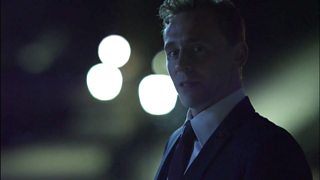How do you bring The Night Manager to life?
It’s taken 30 years to bring John le Carre’s story of The Night Manager to the screen. David Farr was the writer to adapt it. We asked him about modernising the novel, and working with the author.
What drew you to story of The Night Manager?
Well, I always remember watching [John le Carré’s] ‘Smileys People’ on TV with my Dad when I was 14. It was Alec Guinness and Beryl Reid just chatting really but the scene was both incredibly suspenseful and suffused with loss and regret.

I realised then that writing can both exhilarate viscerally and tug at deep emotions, and it can do both things at the same time. I've wanted to adapt le Carré ever since.
How did you go about bringing The Night Manager into the 21st Century?
The Night Manager is a very different story to le Carré’s Cold War novels. It has a searing political anger. He wrote it in the mid 1990s and his disgust aimed at US and UK foreign policy in Latin America was nakedly apparent.
I didn't feel that the Latin American milieu had the prescience now that it did then. I have a personal interest in the Middle East and it felt tragically perfect to set the series there. The Arab Spring was only two years old when I started the adaptation but already one felt the awful unraveling beginning, and the West's utter confusion as to the right moral position to take.
I had a very strong instinct that we must begin in the heart of that once hopeful month of January 2011, in the heart of Cairo. And go from there.
What were some of the challenges you faced?
When you modernise there are dangers. If the piece has a strong attachment to its era, it can resist updating.
This novel didn't do that. In fact the greatest danger would have been only to go half way. le Carré was himself excited to keep the piece contemporary, fresh and vital. So we went for it. We modernised the intelligence services too.
9/11 changed the way everyone thought about intelligence and security. We had to reflect that. The security services started to recruit from a broader and more diverse pool. In particular women were no longer marginalised in the same way. I therefore proposed that Leonard Burr, Pine's handler, become Angela Burr.

You worked very closely with John le Carré. Could you tell us how you collaborated together?
We met in a pub. I rather nervously proposed my changes. He paused then said "Great. Now how shall we do it?" Two hours later we had sailed through the piece, hurling ideas around.

Jonathan Pine turns silence into a virtueDavid Farr
He is hugely knowledgeable. His research is exhaustive. And then, when we'd done that, he sort of left me to it, which was very liberating. He gave notes and wrote a few choice lines himself but he was extremely permissive. It was something of a dream realised to work with him.
How did you bringing le Carré’s quiet hero Jonathan Pine to life for television?
He's a remarkable character. He's got a bit of Joseph Conrad, a bit of Graham Greene. He's very British and yet belongs also in a European existential tradition. I think of movies like Melville's Le Samourai or Army of Shadows. He listens. He does not say too much. He turns silence into a virtue.
But this all comes from a strange shame. A doubt that his soul is pure. And he seeks a father. Perhaps in some way he and Roper are made for each other. The way Tom and Hugh play it, you really do believe there is genuine love between them, which is just right.
Who was your favourite character and whose lines did you most enjoy writing?
I loved them all really. When you write you must love your characters even if they do dreadful things. I'm rather proud of our female Burr. Olivia is wonderful. And I have a soft spot for Corkoran. He's strangely incredibly human and Tom Hollander captures that beautifully.
This article was originally published on BBC One's Facebook page on Thursday 3rd March 2016.
More from The Night Manager
-
![]()
Characters
Get acquainted with the key characters.
-
![]()
Clips
Watch clips from the series.
-
![]()
Episodes
Watch full episodes of The Night Manager online.
-
![]()
John le Carré
Nine secrets about The Night Manager's author.




